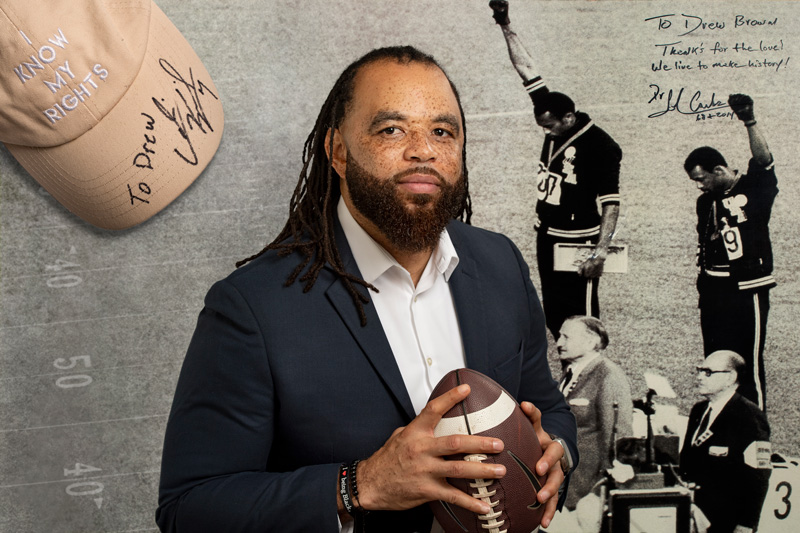


1968: The World Tilts
Photo and illustration by Evan Krape October 18, 2018
UD symposium in Wilmington to explore a turbulent era
The year 1968 shook the United States and much of the world.
The University of Delaware will offer an opportunity to hear from scholars and to reflect on some of the events of that tumultuous year, the seismic cultural and political changes that made them possible and the reverberations we feel to this day.
A daylong Saturday Symposium, hosted by UD’s College of Arts and Sciences, will be held Oct. 20 in Wilmington to explore 1968. The event will be held at UD Downtown Center, 13 E 8th St., Wilmington, DE 19801. The event is open to the public. For details and to register, visit http://www.udel.edu/005244.
The program will include Simone Austin, a UD alumna with a master’s degree in history, speaking on youth activism in Wilmington; Jason Hill, assistant professor and associate chair of art history, whose talk is titled “Unsettling Images: Joseph Louw, Life Magazine, and the Assassination of Martin Luther King, Jr.”; and David Suisman, associate professor of history and coordinator of the Hagley Program in the History of Capitalism, Technology, and Culture, discussing “The Music of '68: People, Power, and Politics in a Pivotal Year.”
Drew Brown, assistant professor of Africana studies, will connect black athlete protests from 1968 to 2018. Brown shared insights into the importance of the black power salute during the awards ceremony at the 1968 Summer Olympics and the nature and significance of sports activism since then.
Q: John Carlos and Tommie Smith famously raised their fists on the medal platform at the Summer Olympics in Mexico City to signify black power in 1968. Was this the beginning of sports activism?
Brown: Definitely not. It was in line with the civil rights movement that was going on at the time, but it wasn’t the first time black athletes had engaged in activism. Jack Johnson and Jesse Owens engaged in activism, and Wilma Rudolph engaged in activism to some extent. And when we come to the 1960s, there were many college football teams that had black players that protested a number of different issues.
This continues beyond the ‘60s of course, with people like Muhammad Ali and Lew Alcindor (who changed his name to Kareem Abdul-Jabbar) to the contemporary period with the galvanizing Black Lives Matter movement and Colin Kaepernick. But John Carlos and Tommie Smith’s courageous display was made on a world stage, and that’s why it was so significant.
Q: Can you tell us something about sports activism in the years between 1968 and today?
Brown: Although there was not a single political movement that coalesced protest in those years, there were actions that have a lot of continuity with what’s happening with the national anthem protests today. But the biggest type of activism between John Carlos and Tommie Smith and today was cultural and aesthetic activism that arose from the hip-hop movement. The person best known for defying the cultural norms restricting black players and their image was Allen Iverson with his big afro or cornrows, his big jerseys and chains, all cultural materials popular in inner city black communities. The league did not want this as their image and banned all these with a dress code so obviously targeted that it was nicknamed the Iverson rule. Iverson was resisting the rejection of black culture by the NBA just by showing up with these authentic black cultural materials.
Q: Is there something unique about sports figures that gives athletes a special platform for activism?
Brown: Anyone in a prominent position can use their popularity to bring attention to issues that matter to people in their community. But sports figures have a unique opportunity because sports cuts across so many communities. Musicians, for instance, can really only speak to the particular demographic that their music appeals to, but sports cuts across all demographics and provides a platform like no other for athletes to voice concerns about issues to folks in different circumstances.
Q: It seems that some athletes have paid a high price for their activism. Can you speak about that?
Brown: Activism in general makes people uncomfortable, so they usually ignore it if they can. In sports, it is particularly hard to ignore because it disrupts people’s enjoyment of their entertainment. On one hand, the disruption makes activism its most powerful, but it also makes the resistance to it more potent. Athletes feel the oppression of their actions through the public’s social commentary, but also from the team ownership. With a high percentage of black athletes in many sports and a high percentage of white decision makers, there are both social and employment repercussions.
Q: What are the intersections of race and sports activism?
Brown: The bigger issue here is that throughout history, black people have been fighting against oppression, fighting for their liberation. When we look back, we honor those who have fought against slavery and lynchings, struggled in the civil rights movement. But here we are today, with black people fighting against oppression and for their liberation, and every step of the way people are telling them they are wrong. I think that when we look back we will see that this was a fight for equality. People applaud black athletes when they conform to stereotypes set out for them, but object when they become more than people expect by articulating a philosophical position. When they step out of the degrading boxes they are relegated to, it leads to comments like, “Shut up and dribble.” Black athletes’ activism is not only them resisting oppression and voicing displeasure with systemic societal problems, it is resisting the very stereotypes imposed on black people.
Contact Us
Have a UDaily story idea?
Contact us at ocm@udel.edu
Members of the press
Contact us at 302-831-NEWS or visit the Media Relations website

